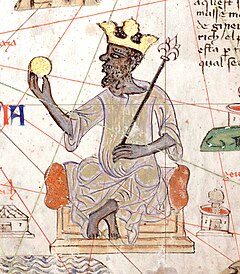


Mansa (N'Ko: ߡߊ߲߬ߛߊ;[1] pl. mansaw) is a Maninka[2] and Mandinka[3] word for a hereditary[1][4] ruler, commonly translated as "king".[5][6][7] It is particularly known as the title of the rulers of the Mali Empire, such as Mansa Musa, and in this context is sometimes translated as "emperor".[8] It is also a title held by traditional village rulers, and in this context is translated as "chief".[1]
Mansa contrasts with another Manding word for ruler, faama. Faama emphasizes the military, coercive authority of a ruler,[9] and can be translated as "tyrant",[10] whereas mansa refers to a hereditary ruler whose authority is derived from tradition[1] and mystical power.[9] A ruler can be both a faama and a mansa, but a mansa was not necessarily a faama.[9]
The word mansa (Arabic: منسا, romanized: mansā) was recorded in Arabic during the 14th century by North African writers such as Ibn Battuta and Ibn Khaldun, who explained it as meaning "sultan".[11] Cognates of mansa exist in other Mandé languages, such as Soninke manga, Susu menge, and Bambara masa.[2] Vydrin also compared it to mensey, the Guanche word for their rulers.[1] According to Misiugin and Vydrin, the original meaning of the root word was probably "chief of hunters" or "chief of warriors".[2]
An alternate translation of mansa, which Jansen attributes to the followers of Marcel Griaule, is that mansa means "god", "the divine principle", or "priest-king". Jansen notes that they have not provided their reasoning for choosing this translation.[6]
|
| ||||||
|---|---|---|---|---|---|---|
| People |
| |||||
| Geography |
| |||||
| Society and government |
| |||||
| Military |
| |||||
| Economy |
| |||||
| Culture |
| |||||
| Other topics |
| |||||
23°25′48″N 72°40′12″E / 23.43000°N 72.67000°E / 23.43000; 72.67000